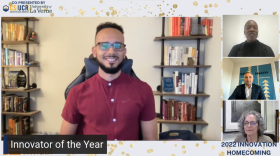With the 2020 census count underway, KVCR is profiling IE RISE, or the Inland Empire Roadmap for an Inclusive and Sustainable Economy.
IE RISE has a couple ambitious goals. It seeks to engage grass-roots organizations, businesses, and government partners, support youth voices, build research and policy capacity within the region, and provide a roadmap for an inclusive and sustainable economy.
Karthick Ramakrishnan is a professor of public policy and political science at University of California, Riverside, and Director of the Center for Social Innovation.
He says IE RISE came about thanks to the combined efforts of many Inland Empire nonprofits.
“So the nonprofit sector, including a lot of civic engagement partners, got together and put together a vision and it's remarkable how predictive it is of where we are now,” says Ramakrishnan.
Ramakrishnan says that team-up led to a lot of census outreach work.
“When it came to early 2020, it was amazing the kind of relationships we had built and the work that was happening, so we started thinking ahead. It's so important to plan ahead, we didn't want to be in a situation where we are done with the census and then figuring out, okay, what's next? So we were all anticipating being done around June, this is before the pandemic hit, and we said, let's try to figure out what's next and a lot of our census partners said, this is what we've been wanting to do all along, this can build on something, build something that really draws on all of the expertise and collaboration from census to really include our region," Ramakrishnan says.
Sky Allen is the lead coordinator for IE RISE.
"For us, IE RISE was really really important because we had built so much power and so much community, partnering with people across regions, across issue specialties, with different areas of the two counties, people who - some people work on immigration, some people work on housing, some people do more voter engagement of civic engagement, but all of these different partners working together in utilizing the strategies that are native to them, just thinking about how to strengthen the region through this specific project, really inspired us to say we want to keep this going but honor the work that's already happening,” Allen says.
Karla Lopez del Rio is a former Census Bureau Specialist for Riverside County, and is now with the Center for Social Innovation.
“We saw at the Census Bureau that even the community groups help each other out, they understood themselves as a community rather than just separate, hard-to-count populations. And that was I think was a great legacy from the Census Bureau that I believe now that I'm outside of the census that that's the type of government that we want to see in the future. Governments that are participatory but are also creating infrastructure within government for these new types of conversations to be possible," Lopez del Rio says.
According to Lopez del Rio, the networks with local leaders that IE RISE created was instrumental in helping the Census Bureau prepare for hard-to-count communities in the Inland Empire.
“Riverside and the Inland Empire are some of the fastest-growing regions in the nation, they're also some of the most complex because we have a variety of geographies that are extremely difficult for the Census Bureau to cover, and that made the leadership at the local level even more important," she says.
I want to tell you that as a Census Bureau official, it is much easier to deploy operations for census count in communities that have social capital and have networks that are strong among leaders. And have leaders that understand their systems and how to use them. It's much easier to have government work well in those communities than when there's absence of that.”






